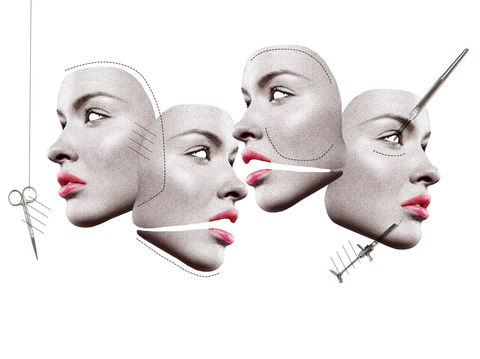Plastic Girls in a Plastic World
Cosmetic plastic surgery encourages body shaming; reconstructive plastic surgery may be headed down the same track.

PHOTO | MCT Campus
Living in a world where people are expected to live up to society’s standards of the “perfect body,” which doesn’t tend to come naturally, causes many people to turn to other forms of achieving perfection. One of the most popular forms of achieving this impossible body is cosmetic plastic surgery. Morally, it is not okay for people to redesign who they naturally are in an effort to conform to the standards of society. Plastic surgery brings this to the forefront and also brings up the fine line between necessary reconstructive plastic surgery and choosing cosmetic plastic surgery. No one has the authority to tell someone that they can’t alter their body, but a line must be drawn, and soon, between necessary alteration and unnecessary alteration.
There are two kinds of plastic surgery, cosmetic and reconstructive. Cosmetic is choosing to improve one’s appearance by surgery to for example increase breast size, increase lip size, or change to a more desired nose shape. Reconstructive is often needed to reconstruct a part of one’s body to be able to function normally because of something that has happened. For example, a cleft lip repair would require a form of reconstructive surgery. As of Oct. 23, Instagram decided to ban the use of the “plastic surgery” filter on the social media network. The reasoning behind this, Instagram says, is in an effort to protect user’s mental health and wellbeing.
Women in 2019 advocate for rights to their own bodies more than ever before. While this is a great thing to advocate for, it can go too far. For instance, with the topic at hand, plastic surgery. The push for “this is my body and I do with it what I want” can be too much. Truly living in your own body does not include changing parts of oneself. Being one’s authentic self does not include becoming someone you never were. Adapting that temperament causes women and girls to fall into society’s trap of what the perfect female looks like according to a study performed by psychology professor Jennifer Mills and student Jacqueline Hogue. The number of women that get breast augmentations and buttock enhancements is rising. The number of breast augmentation surgeries performed in 2018 was 313,735, going up four percent since 2017, according to American Society of Plastic Surgeons. This proves that plastic surgery only drives home the pitch that society gives about body negativity.
While cosmetic plastic surgery is a choice, reconstructive plastic surgery often isn’t. Many people who have reconstructive plastic surgery have been involved in some kind of accident (fire, car accident, severe injury) or were born with a birth defect (cleft lip, cleft palate) so the surgery is very much needed according to plasticsurgery.org. Without thinking too much, reconstructive seems morally fine. Unfortunately, it too can cross the line. In 2018, approximately 5,805,880 people needed reconstructive plastic surgery, according to American Society of Plastic Surgeons. The request to reduce wrinkles a bit, or increase face firmness during a reconstructive surgery is morally on the same level as the cosmetic surgery. The additional procedure detracts from the need and reinforces the stigma around aging in the United States.
One form of plastic surgery that is not agreed upon is implants, specifically for breast cancer patients. This is an exceptional situation in the cosmetic plastic surgery world. The surgery is done to make women feel like they haven’t lost something after already going through so much emotionally with a cancer diagnosis followed by chemotherapy, radiation and much more. Forty percent of women who have had a mastectomy have breast reconstruction surgery, according to Federal Agency for Healthcare Research and Quality. This is also true for breast reduction surgery which many women decide to have because of the immense back pain they have to deal with daily. While cosmetic surgery isn’t okay in many circumstances, this is one of the few times when cosmetic surgery is completely permissible.
The idea of plastic surgery and enhancing body appearance contradicts the new and upcoming movement of body positivity and acceptance. Celebrities and social media influencers who encourage body positivity but have had cosmetic plastic surgery are not only contradicting their own morals, but sending the wrong message to their followers. Some actions are being taken to reduce this message, such as Instagram’s removal of the plastic surgery filter. Being comfortable in one’s skin and working to increase inclusion of all body types will assist in eliminating the “ideal model” body style that society has formed and is something that is destroyed by plastic surgery.


